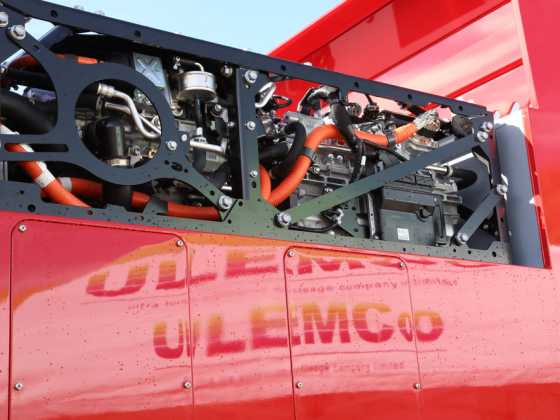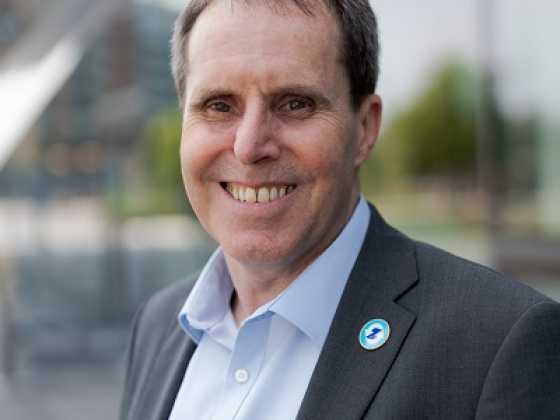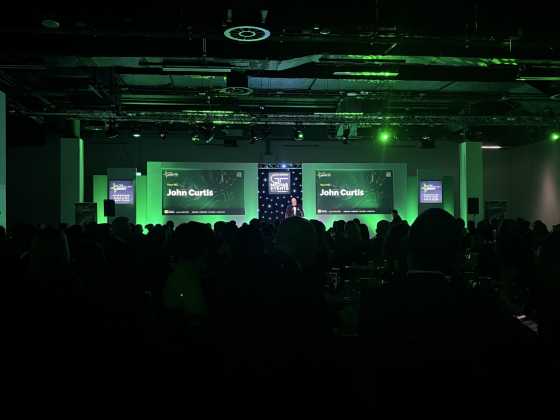Getting closer to an electric-HGV future

Mike Boxwell, group CEO of Voltempo, speaks to Robyn Quick on the progress of the eFREIGHT 2030 project, which seeks to prove the business case for electric HGVs and truck-friendly charging.
Can you tell me about the eFREIGHT 2030 project?
The eFREIGHT 2030 consortium brings together some of the UK’s leading specialist logistics providers, retailers, leading fleet operators and SMEs, all seeking to lead the way in decarbonising their operations and business sectors.
Our vision is to demonstrate how zero-emission e-HGVs can replace conventional HGVs (heavy goods vehicles) at scale, using British technology. We’re using next-generation e-HGVs from Renault Trucks, DAF and Scania, plus state-of-the-art British-designed 1MW charging technology from Voltempo, and Berkeley Bulldog’s range-extender e-trailer, built in Pembrokeshire, which can add a further 200-250km to the range of the vehicle without compromising the load capacity of the trailer.
By undertaking a genuine, real-world evaluation of the technical and commercial viability of electric trucks, we aim to prove the business cases for e-HGVs and a publicly accessible network of 1MW e-HGV charging hubs across the country. A key part of this will be to stretch boundaries by focusing on ‘difficult’ use cases, including long-range, multi-shift and power take-off, using data modelling to resolve challenges.
The eFREIGHT 2030 consortium is introducing 100 demonstrator vehicles and 32 new charging locations, all of which will have megawatt-charging capacity from day one. As well as our consortium fleets, our aim is to reach out to the wider industry, which is why we have reserved ten vehicles for short term use by Associate Members of the consortium.
This will enable smaller operators to evaluate the capabilities of electric trucks on a short-term basis along with appropriate interim charging solutions, derisking confidence building activities before making decisions about permanent fleet replacement.
Consortium member Dynamon is bringing a full data and planning service using its ZERO software package.
This allows consortium operators to plan the most efficient use of their vehicle fleet, both diesel and electric, and analyse their business model to identify when specific vehicles or routes can be decarbonised.
This is just the starting point. As use-cases are proven in consortium fleets, the 100 test vehicles will be moved to new operations and backfilled with new e-HGVs. We expect the initial £49.2 million in government support to help unlock some £500 million of private investment from consortium members in
electric vehicles and charging hubs across the UK by 2030.
Our goal is to facilitate 2,000 electric HGVs on UK roads by 2030, which would eliminate around 60 million litres of diesel fuel from use. What progress has been made?
How is it going so far?
Work on the eFREIGHT 2030 project began in early 2024 and will take seven years to complete. We are just entering the third quarter of the project, and right now we are on target and achieving everything we expected to at this stage.
In the main, 2024 is a building year where we get infrastructure in place and plan the selected commercial routes, with a handful of electric HGVs expected to go on the road during Q4.
2025 is a rollout year, where vehicles and charging systems are rolled out across the fleets in the consortium, and I’m pleased to say that so far everything is on track. Do you think the future looks bright for zero emission HGVs? Absolutely! Our focus has always been wider than just the needs of the eFREIGHT 2030 consortium members when it comes to success, this is about revolutionising the industry for all involved.
There are a lot of hurdles to overcome: the infrastructure, the duty cycle and the costs. We’re working hard to understand the problems, to clearly communicate with the right stakeholders and, ultimately, to demonstrate the capabilities of a managed depot network and Fleete Charging Hubs to get real-world use of electric HGVs so we can learn how we can overcome the doubts and concerns and make electric HGVs the vehicles of choice in the future.
We’re engaging with the government to help them understand where legislation may need to change to enable electric HGVs to carry similar payloads to today’s diesel vehicles.
We’re working with the electricity industry to provide long-term planning tools to overcome issues with the grid, we’re working with Truck OEMs to understand how electric HGVs will develop over the coming few years, and we’re working with the charge point operators to help them create fundable business models for infrastructure rollouts, and creating a nationwide HGV charging network.
Finally, we’re engaging with the end customers, to understand their needs for decarbonised freight movements and creating new business models for fleet operators to win new business using electrified transport.
As an industry, the progress we are making is remarkable, and technology continues to advance at pace. What is clear is that working collaboratively has been and will remain key to help accelerate our journey to zero emission HGVs.






